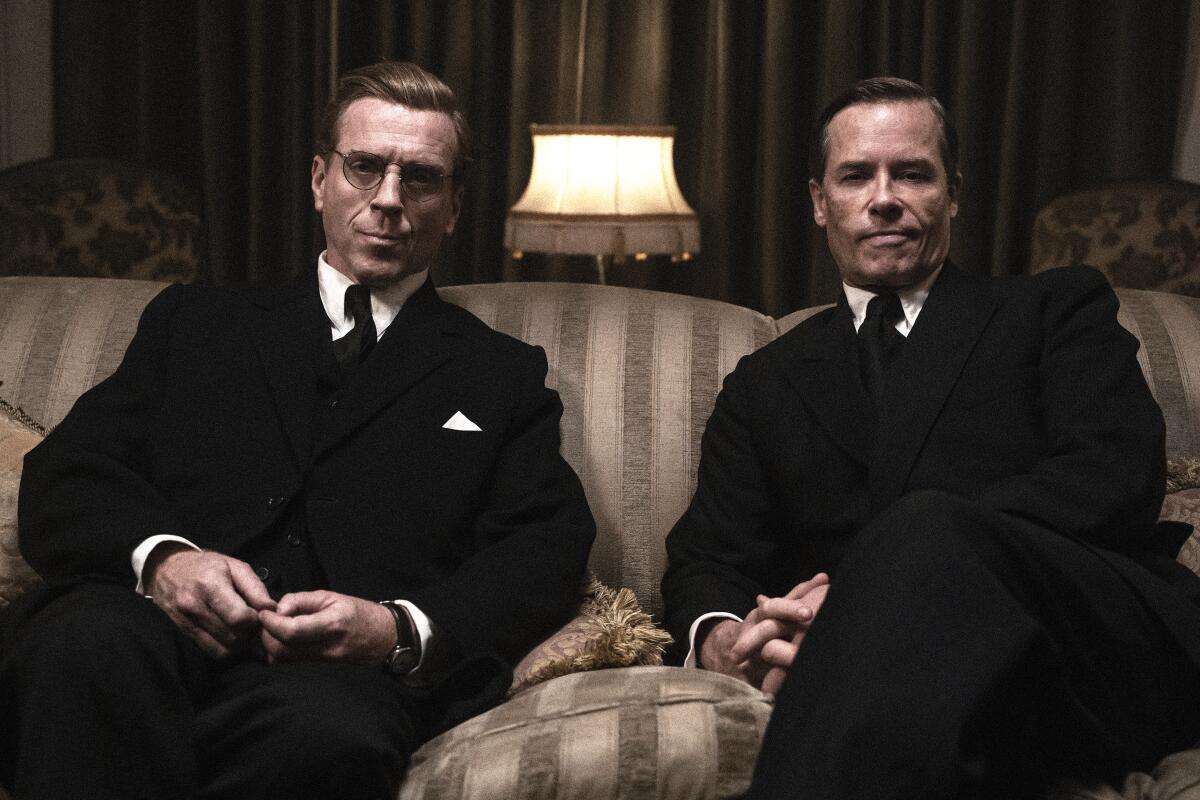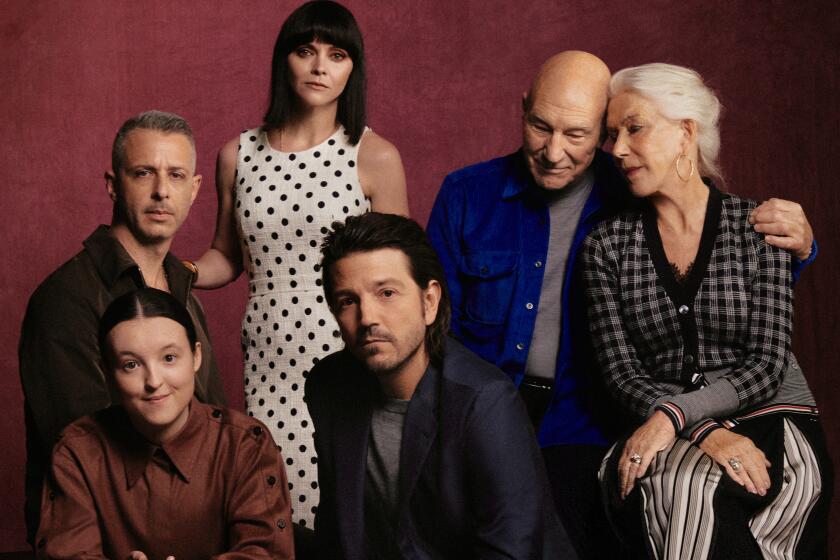Damian Lewis and Guy Pearce dig into a real-life MI6 double agent story

- Share via
He’s portrayed intense terrorist Nicholas Brody in “Homeland,” domineering mogul Bobby Axelrod in “Billions” and mercurial King Henry VIII in “Wolf Hall,” but Emmy-winning British actor Damian Lewis rarely plays the fool. Breaking type in the fact-based Cold War thriller “A Spy Among Friends,” Lewis chose to portray MI6 operative Nicholas Elliott, who’s stunned by the realization that his best friend Kim Philby is a traitor working for Communist Russia.
The MGM+ limited series, based on Ben Macintyre’s book of the same title, casts Australian actor Guy Pearce (“L.A. Confidential,” “Memento,” “Mare of Easttown”) as the lethally charming Philby. Set in 1963, “A Spy Among Friends” hopscotches through three decades of flashbacks that culminate inside a Beirut safe house: Elliott’s supposed to bring Philby back to England, where he’ll face the consequences of his treachery. Instead, Philby flees to Moscow.
In separate interviews, Pearce, speaking from Toronto, and Lewis, in New York City, burrow into the high-risk, low-affect realm of English gentlemen who once dominated British intelligence.
Our BuzzMeter panel of veteran TV journalists predicts the winners in 14 categories of the 2023(?) Emmys. You can, too, in our weekly polls.
Getting into character
Lewis: I’m great friends with [“Spy Among Friends” showrunner] Alex Cary from “Homeland” days and I loved his pitch, so it was just a question of whether I would play Philby or Elliott. Philby is the rock star, the most successful traitor of the 20th century. Most people have never heard of Elliott. He was totally blinded by a kind of brotherly love that bordered on infatuation because Philby was so charismatic. In recent years, I’ve played a lot of alpha-dominant males so I thought it would be interesting to play the cuckold, the jilted lover, if you will.
Pearce: I was [late to] this project because originally Dominic West was going to play Philby but he became unavailable. I’d worked with the director Nick Murphy before on “A Christmas Carol” and he thought of me for this. Philby was a fascinating character to play, I have to say. He had four wives, drank himself to death. He was a mess, full of contradictions. To the very end, he talked about his belief in communism but that didn’t stop him from enjoying the spoils that come with being a member of the British aristocracy.
Going to private school
Lewis: The place I went to school, Eton, certainly used to churn out this kind of gentleman. Kim Philby went to a similar school called Westminster. This is a world I know well. These are people I’ve grown up with and continue to spend time with at certain points. That ruling class type of man still exists although they have things less their own way nowadays because things have changed, thank God. But for Philby and Elliott, being part of that ruling class gave them this ease with which they could walk through doors because they’d gone to the right schools and belonged to the right clubs. It was almost like a secret handshake: “You’re one of us.”
Pearce: I was born in England, my family is from the north. My mother had disdain for the British ruling class but at the same time, she wished deeply that she was part of it. She sent me to this very expensive private school. Part of me hated it but at the same time, going to that school gave me a kind of confidence, so in a funny way I understand Philby’s upbringing. Some people in Australia are still hanging on to that British aristocracy idea and I was brought up in a version of that.
Hopscotching through time
Lewis: “Spy Among Friends” is a complicated, sprawling, multi-country story taking place over a long period of time. [Traditionally] If you write A, it follows that the payoff will be B and it will come. With “Spy Among Friends,” we tended to start with B and then you learn about A later. We didn’t use chyrons [to denote different years] so it can sometimes be a bit opaque, but this is one of the things audiences have really responded to.
Pearce: The time jumps were tricky. For example, the Russian freighter sequence [depicting the escape to Russia] is intercut with sequences from Philby’s past, so I’d go, “Hang on, these five lines here are from 1961 then we jump back to 1958 then we jump back to 1942.” I literally had to take scissors and cut out all the bits from 1961 and stick them together on the cupboard wall and say, “Here’s the one scene that we’re going to film.” It’s just that you’ve intercut it to the bejesus with 6 million other bits.
Duplicity versus sincerity
Lewis: Philby’s been identified as a double agent and Elliott’s sent to Beirut to bring him home. There are four days of interrogations, all of which are transcripted [by a hidden microphone] except for a couple of minutes when they throw open these French windows onto a noisy street and all of that is lost. At the end of the four days, Philby goes to Moscow. The central question for us was did Philby outwit Elliott? Did Elliott betray his country in the name of friendship and love and let Philby go? Or three, was there a double play here? What we attempt to show is that in the final moment, Elliott, the likable best friend, shows a killer’s instinct. He knows that by sending Philby to Moscow, there’ll be no more drinking gin and whiskey at his favorite gentlemen’s club, no more theater in the West End, no more visits to the country house on the weekend. Philby’s going to live in Communist Moscow, and that’s the end of his life as he knows it.
Pearce: A common device as an actor when you’re playing a lie is to play it really big, winking at the audience even though the other character [in the scene] can’t see it. But [director] Nick Murphy said Kim’s much better at his job than that so we never want to see you lying. We also wanted to show Nick and Philby getting drunk together, reciting silly limericks and singing daft songs. That’s part of the British ruling class male [behavior] of the time, and even now, where talking about emotional stuff is very difficult. So that’s part of the interrogation. Philby [essentially] says to Elliott, “I’ll answer your question if you’ve got the guts to ask it. But you haven’t got the guts to talk about what’s really going on, so I’m just going to sit here and make you suffer.”
“Are You Lonesome Tonight?”
Lewis: There’s this magic realist moment at the theater where Philby appears [on stage] in Nick’s imagination singing “Are You Lonesome Tonight?” At that point, we’d already shot all the Beirut stuff and now I’m sitting in the darkness of the theater listening to Guy, who has a beautiful voice — I found it very easy to be moved. We wanted to show the personal cost of this betrayal because in our story, Philby sort of breaks Elliott‘s heart.
Acting together
Pearce: I felt a real emotional connection with Damian because I’d worked with his wife, Helen McCrory, on “The Count of Monte Cristo” in 2002 and she was spectacular. Helen passed away just before we started shooting, so when I first met Damian it was hard for me not to tear up. That’s the last thing he wanted but I couldn’t help it. I said, “I can’t believe you’re still doing this show.” And he said, “Helen told me before she died, ‘You better f— do this show with Guy.’ It probably helped Damian stay a little distracted from the grief. He’s a really strong guy who wanted to get on with the work and keep that stuff separate.
In a roundtable conversation, Diego Luna, Helen Mirren, Bella Ramsey, Christina Ricci, Patrick Stewart and Jeremy Strong dive deep into their appreciation of writers, mothers and “not giving a f--”
More to Read
Sign up for The Envelope
Get exclusive awards season news, in-depth interviews and columnist Glenn Whipp’s must-read analysis straight to your inbox.
You may occasionally receive promotional content from the Los Angeles Times.









